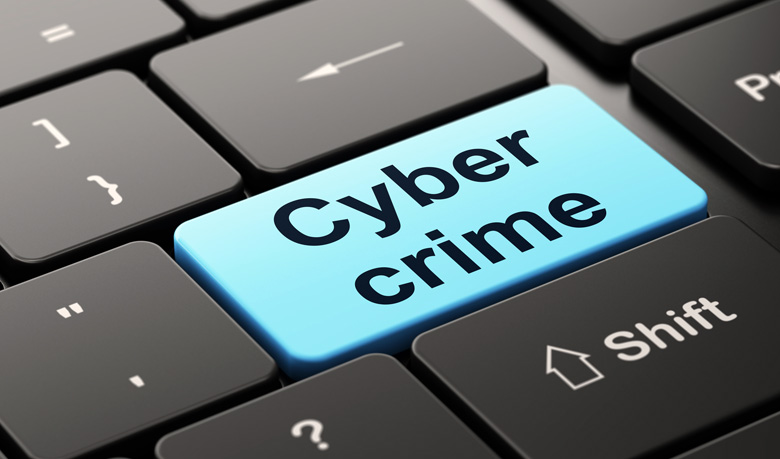Cyber crime in Bangladesh: A growing threat in digital marketplace
Augustin Sujan || risingbd.com

The presence of cyber crimes relies heavily on the Internet and online activity
Debasish Das: The use of internet has become the part and parcel of every educated person in this world. It has opened the gates to the information superhighway connecting the rest of the world to whole a lot of information and to all corners of the world at once.
Internet connects the person sitting in the remote corner of the home or office to the entire world thorough the information highway called passionately web, cyber, etc. It connects everyone to his office, bank, electricity dept, water works, travel service, bazaar, bookshop, friend in other country and also dangerously and unknowingly to cyber criminals waiting to hit the gullible internet user.
So comes to web of national and international laws with its enforcing agencies and intelligence to curb this menace of cyber crimes and protect the society from high-end, sophisticated, high-tech criminals. The effectiveness of the implementation of the cyber laws in Bangladesh is an utmost important to protect our society new generation of crimes and criminals and whether it has been successful in Bangladesh or not is the present research question.
With a global population of almost 7.5 billion and an Internet population of 42%, solving cybercrime is one of the world’s current digital challenges. Many times people may be confused as to the classification of what constitutes cyber crime. Although this classification is somewhat confusing, due to the relative novelty field or lack of tangible nature, cyber crime refers to any illegal action that is committed through an electronic-based medium or targets a computer-based platform.
Cyber crime is a very popular word in digital world. What is cyber crime? Basically, Cybercrime is defined as a crime in which a computer is the object of the crime (hacking, phishing, spamming) or is used as a tool to commit an offense (child pornography, hate crimes). Cybercriminals may use computer technology to access personal information, business trade secrets, or use the Internet for exploitive or malicious purposes. Criminals can also use computers for communication and document or data storage. Criminals who perform these illegal activities are often referred to as hackers.
Common types of cybercrime include online bank information theft, identity theft, online predatory crimes and unauthorized computer access. More serious crimes like cyber terrorism are also of significant concern.
Cybercrime encompasses a wide range of activities, but these can generally be broken into two categories:
1. Crimes that target computer networks or devices. These types of crimes include viruses and denial-of-service (DoS) attacks.
2. Crimes that use computer networks to advance other criminal activities. These types of crimes include cyber stalking, phishing and fraud or identity theft.
The FBI identifies cybercrime fugitives who have allegedly committed bank fraud and trafficked counterfeit devices that access personal electronic information. The FBI also provides information on how to report cybercrimes, as well as useful intelligence information about the latest cybercriminals.
Related Terms: cyber, crimeware, cyber forensics, hack, hack tool, collateral, hacking, Carnivore, Hand of Thief Trojan, Windows XP security update hack, Phishing, Online Fraud Protection, Phishing, Online Fraud Protection, Identity Theft, Booter services etc .
In general, victims of cybercrime are Desperados and greedy people, Gullible, Unskilled and Inexperienced and Unlucky people. Reasons of cybercrime are benefit individual or a group bad people. Hart in his work “The Concept of Law” has said ‘human beings are vulnerable so rule of law is required to protect them’. Applying this to the cyberspace we may say that computers are vulnerable so rule of law is required to protect and safeguard them against cyber crime.
Cybercrime does not know the border. The same technology that brings people of the world closer together has a darker side, making it easier for criminal or malicious elements to steal, destroy, corrupt, defraud and exploit. They do not have to be near they can do so from another country or continent. Internet technology has come to Bangladesh quite late. But, the country does not leg behind when it comes to cybercrimes. As most of the organizations in Bangladesh are very keen to use the opportunity of the internet technology, the potential threats cannot be ruled out. Due to availability and comparatively cheaper prize of a personal computer, interest to use them for day to day personal business is being grown up.
The parliament of Bangladesh passed a bill increasing penalties for cyber crimes setting a minimum of seven years’ imprisonment and a maximum of 14 years or a fine of Tk 1 crore or both, ignoring protests by civic forums and rights groups. The information and communications technology minister, Mostafa Faruque Mohammad, moved the Information and Communication Technology (Amendment) Bill 2013 proposing ten amendments to the ICT Act 2006. The bill made offences under Section 54, 56, 57 and 61 of the 2006 act cognisable and non-bailable, empowering law enforcers to arrest anyone accused of violating the law without a warrant, by invoking Section 54 of the Code of Criminal Procedure. In the 2006 act, all such offences were non-cognisable.
The minister in the objectives of the bill said that it was placed to ensure the widespread use of information and communications technology, to contain the misuse of ICT and to meet the necessity of amending some sections the Information and Communication Technology Act 2006.
Mustafa Jabbar, president of Bangladesh Computer Samity, said many cybercrimes or digital crimes did not fall under the purview of the law. For example, the law did not address any crime committed through using mobile phones. The law also considers e-mails as evidence, which conflicts with the country`s Evidence Act which does not recognize e-mails as evidence, but the amendments did not address these issues, Jabbar noted.
But the question is that how do we protect individual or organisation form this dangerous harmful activates? My personal experience is to share with you that my email been hacked two-times due to my week password and own negligence. Therefore, we should remember that –prevention is always better than cure.
Cyber Crime Prevention Tips
Avoid being scammed
Always think before you click on a link or file of unknown origin. Don’t feel pressured by any emails. Check the source of the message. When in doubt, verify the source. Never reply to emails that ask you to verify your information or confirm your user ID or password.
Call the right person for help
Don’t panic! If you are a victim, if you encounter illegal Internet content (e.g. child exploitation) or if you suspect a computer crime, identity theft or a commercial scam, report this to your local police. If you need help with maintenance or software installation on your computer, consult with your service provider or a certified computer technician.
In my research I found Cybercrime has already become a major concern in both private as well as public sector in Bangladesh. During the last decade private and public sector have done a revolution with the use of technical enhancement. Due to unauthorized intervention to the system, company loses huge confidential information which caused a large amount of financial loss. It has already been identified that especially Financial Institutions are in the most threading organization for cybercrime that at the same time reflects to the personal life. Some development partners have started working how to tackle cybercrime and improve effective communications and stop cyber crime in their institutions. In my concern as the use of computers has grown, cybercrime has become more important. Cybercrime, as a transnational crime, is a global issue with a global impact. Increased sophistication of cybercrime attacks and vulnerability of information available online is serious concern for institutions, law enforcement agencies and other stakeholders.
But it is important issue that whatever the excellent rules was made by the government to stop the cyber crimes in their own country. One thing is very vital that justice system should be established properly within the experience manpower; otherwise the stakeholders will not be benefitted from the wonderful cyber crime rules. Remember the big rule will play by the law and enforcement agencies. Therefore, it requires very highly trained and qualified dedicated manpower to fulfil it s goal.
The Government should establish one or more cyber appellate tribunal. The appellate tribunal shall be constituted by one chairman and two members appointed by the government. To be appointed as a chairman of Cyber Appellate Tribunal, he must be either a former judge of the Supreme Court or existing judge of the Supreme Court or is eligible to be appointed as a judge of the Supreme Court. One of the two members of the tribunal shall be a retired District Judge or employed in the judicial service and the other member must be an experienced and skilled person in information and communication technology. They shall be appointed for 2-3 years. Cyber Appellate Tribunal shall have no original jurisdiction. It shall only hear and dispose of appeals from the order and judgment of the Cyber Tribunal and Sessions Court in appropriate cases. The decision of the appellate tribunal shall be final and it shall have the power to alter, amend, and annul the order and judgment of the cyber tribunal. The appellate tribunal shall follow the appellate procedure of High Court Davison of the Supreme Court. Until cyber appellate tribunal is established, appeal may be heard by the High Court Division.
My research journey and would sincerely try to find the present level of the implementation of cyber laws in Bangladesh and also try to find suitable models for enforcement of cyber laws, prevention of cyber crimes and training requirement of enforcement authorities - through of my research which would be of help for government and all other stake holders in the process and especially to the benefit of the society in creating fearless environment where they will have happy surfing, e-banking, e-shopping and e-mailing internet experiences for their lifetime.
The main aim of my research is to address the issues of prevention, investigation, prosecution and punishment of cyber crimes by Bangladeshi’s law enforcing authorities in the first level and in the second level about creating awareness, technical knowhow about the cyber crimes for detection, prevention and investigation purposes through suitable training and development programmes to a) investigating officers b) judicial officers c) internet centers d) educational institutions and e) general public ( internet users) and in the third level the research would try to devise suitable “enforcement and technical” models to prevent and free the whole society from such sophisticated and dangerous crimes. The Government should start pilot study to develop the technical and logistics support for the cyber crimes team and create better team within the work frame to tackle the total cyber crime network in national and international level.
The pilot study should be conducted at the internet centres revealed several issues on the internet scenario of internet users and it has helped to frame the following main research objectives. The specific objectives of the pilot study should be included :1.The nature and number of cyber crimes intimated to the cyber police in Bangladesh 2.The nature and number of cyber cases investigated (and charge sheeted)by cyber police. 3.The nature and number of cyber cases brought before the court and the effectiveness of the process of administration of justice in these courts.4.The nature and number of cyber criminals prosecuted by court and the nature and number of cyber cases left untried for technical defects and problems.5.whether the general public i.e internet users are aware of different types of cyber crimes and what is the level of their understanding and whether they are equipped to protect themselves from cyber crimes ( while in internet use).6.whether the Bangladeshi’s cyber police are properly trained to handle cyber crimes effectively. These are the factors should need to be considered in the pilot study in the cyber crime area to develop properly and work effectively.
The presence of cyber crimes relies heavily on the Internet and online activity, and as a result, regulations and oversight of this type of activity has been expressed in the spectrum of Cyber Law. Cyber Law is a fairly expansive legal field that consists of a variety of avenues and jurisdictions, including the ethical and moral use of the Internet for lawful and legal purposes.
Basically, no notable cyber crime has yet been committed in Bangladesh. The gradual dependence and extensive use of computer and information technology by the financial institutions like bank, insurance company, and other non-government organizations increase the fear of commission of cyber crime here. Computer has been used as a tool of crime like making forged certificates and documents for a number of years in Bangladesh though the incident of targeting computer or computer system is very unusual. The use of information and communication technology has been playing a vital role in the 21st century due to globalization and the government is encouraged to adapting with the coming future. The present government concepts of Digital Bangladesh is an Idea that includes the IT use for management, administration and governance to ensure transparency, accountability and answerability at all levels of society and state. But cyber crime is very important issue within the private and public sector in Bangladesh. Therefore the biggest challenge is that cybercrime in Bangladesh – A growing threat in digital marketplace.
Debasish Das: DBM (Distinction) MA, MBA (UK), Author in many books in multi disciplines, Research scholar & freelance writer, worked in a Renown University in UK at present Working in Facilities and crime Prevention Unit, Public Sector in UK.
risingbd/DHAKA/Oct 26, 2015/Augustin Sujan
risingbd.com























